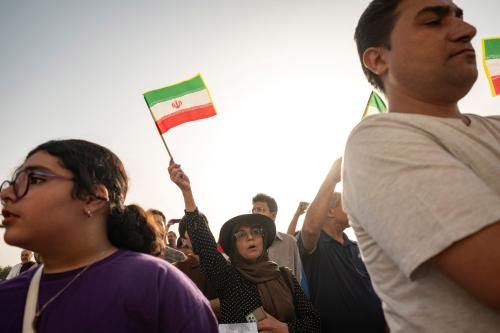The trial of former Iraqi President Saddam Hussein was supposed to be part of the healing process in Iraq. It was intended to send a signal to the rest of the region about the fate of dictators and the beginning of a new era of democracy. Instead, it has merely served to reinforce sectarian divisions within Iraq and highlight Arab public resentment of American foreign policy and of the emerging governing order in Iraq.
From the outset, international human rights organizations have doubted the ability of an Iraqi entity under foreign occupation to conduct a fair trial that does not appear to be a victor’s court. Arab public opinion has continued to view the trial as an American-backed enterprise intended to justify an unpopular war. Even the obvious and serious violations of human rights by Saddam Hussein’s regime have been difficult to push to the front of Arab concerns, given the many reports of torture in Iraq, both by the United States military and by the Iraqi government.
The picture of Saddam Hussein in captivity did have an early impact, especially on rulers: here was an almost absolute Arab ruler of an important country–which on the eve of its invasion of Kuwait seemed on the verge of assuming an Arab leadership role–helplessly held prisoner. The implications were not missed by many rulers. Many in the Arab world who long opposed Saddam Hussein–while many others admired him–were in some ways pleased to see him removed from office and were hoping that the promise of political reform in the region could be fulfilled.
But from the outset, the vast majority of Arabs opposed the American-led war and saw in it motives that had little to do with the spread of human rights and democracy. In surveys I conducted with Zogby International in six Arab countries (Egypt, Saudi Arabia, Morocco, Jordan, the United Arab Emirates and Lebanon) both before and after the war, the majority believed that the US aimed to control oil, help Israel and weaken the Muslim world. Only small minorities believed that the aims included the spread of democracy and human rights. Thus, even many of those who were not admirers of the former Iraqi ruler were uncomfortable seeing a sitting Arab president captured by a foreign power whose aims they opposed.
Since then, the picture has gotten worse as the trial has continued to unfold. If some had harbored hope that the removal of the Baathist regime would usher in a better era in Iraq that might inspire others in the Arab world, these hopes have all but disappeared among the Arab public. To be sure, Iraqis remain split on the benefits of the new order, with Shi’ite and Kurdish majorities seeing it as a good thing and most Sunnis opposing it. But outside Iraq, majorities of Arabs continue to believe that Iraq is worse off than it was under the rule of Saddam Hussein, and, even worse, that the Middle East is now less democratic than it was before the war. Thus one of the key intended messages of the trial was dead on arrival.
The trial has had important moments that should have led to contemplation among all who have followed it, regardless of their political views. Many victims of the Iraqi regime spoke movingly of the horrors they suffered. Yet even these dramatic moments were undercut by the prevalent suspicion of the legitimacy of the whole enterprise, of the fact that this has not been an independent international tribunal whose credibility is established. Reports of major torture episodes by coalition forces and by the new Iraqi forces, exemplified by the Abu Ghraib prison abuse pictures, have vastly weakened the impact of the evidence of Saddam’s abuses. In an especially powerful episode, Saddam’s lawyers turned to one of his victims who told of being abused by Saddam’s forces in that same prison and pointedly asked her if Saddam’s jailers had unleashed dogs against her. The image that the question evoked in the minds of the Arab public was even more powerful than the testimony of the distraught victim.
In the end, the trial has had a polarizing impact on Iraqis themselves, and a mostly negative impact in the Arab world. For the many Iraqis, mostly Shi’ites and Kurds, who suffered at the hands of the Baathist regime, the trial has served to comfort and has reinforced their view that removing the regime was a good thing. For most Sunni Arabs the trial has served to highlight their new weakness. In the rest of the Arab world, most have seen the trial in part through the prism of the Iraqi Sunni Arabs, in part through their resentment of American foreign policy, and in part through the fear that the Iraq war has served to weaken the Arab and Muslim worlds and to spread anarchy and division within Iraq.
The Brookings Institution is committed to quality, independence, and impact.
We are supported by a diverse array of funders. In line with our values and policies, each Brookings publication represents the sole views of its author(s).



Commentary
Op-edArab Public Opinion and the Trial of Saddam Hussein
May 11, 2006